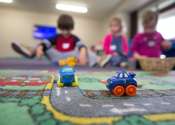A school (from Greek σχολή (scholē), originally meaning "leisure", and also "that in which leisure is employed", "school"), is an institution designed to allow and encourage students (or "pupils") to learn, under the supervision of teachers. Most countries have systems of formal education, which is commonly compulsory. In these systems, students progress through a series of schools. The names for these schools vary by country (discussed in the Regional section below), but generally include primary school for young children and secondary school for teenagers who have completed primary education.
In addition to these core schools, students in a given country may also have access to and attend schools both before and after primary and secondary education. Kindergarten or pre-school provide some schooling to very young children (typically ages 3-5). University, vocational school, college or seminary may be available after (or in lieu of) secondary school. A school may also be dedicated to one particular field, such as a school of economics or a school of dance. Alternative schools may provide nontraditional curriculum and methods.
There are also non-government schools, called private schools. Private schools may be for children with special needs when the government does not supply for them; religious, such as Christian Schools, Khalsa Schools, Torah Schools and others; or schools that have a higher standard of education or seek to foster other personal achievements. Schools for adults include institutions of corporate training and Military education and training.
In homeschooling and online schools, teaching and learning take place outside of a traditional school building.









